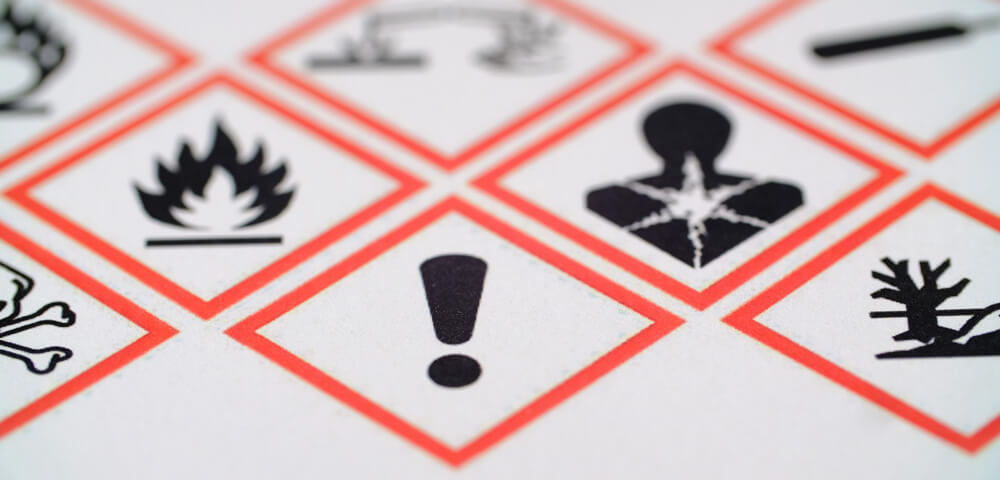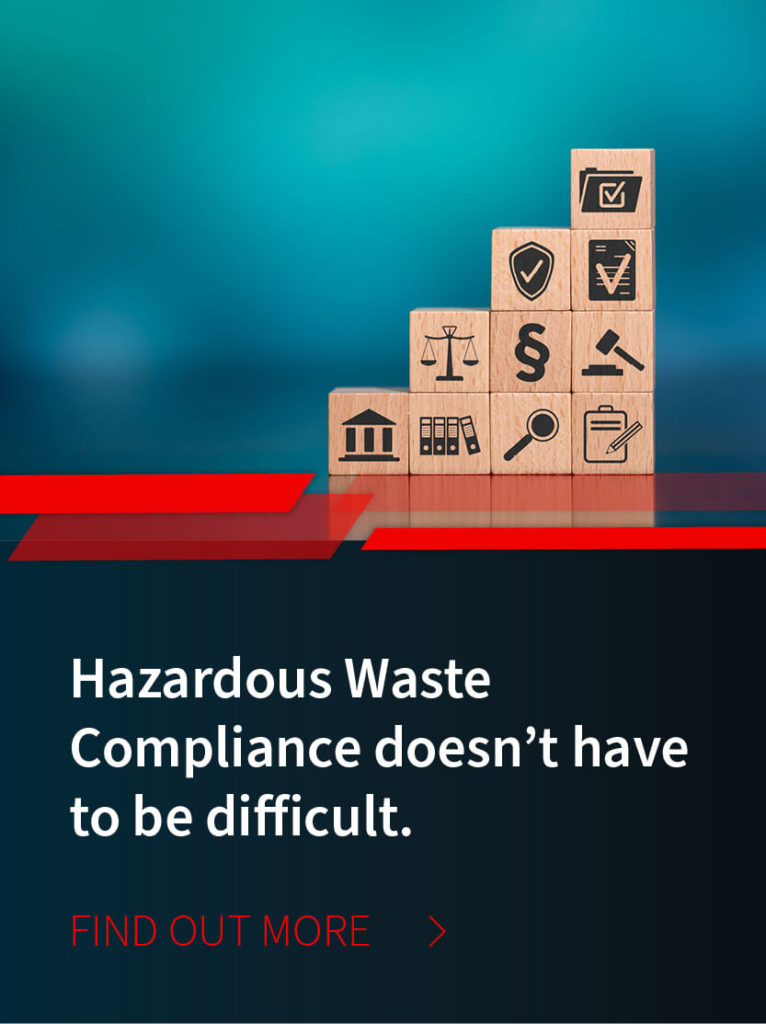
/ IN THIS BLOG
01 / What Is RCRA Hazardous Waste, and why is it Important?
RCRA stands for the Resource Conservation and Recovery Act, enacted into legislation in 1976. It’s a federal law that established rules and regulations for the proper, safe, and compliant disposal of both solid waste and any waste designated as hazardous.
This law also defines the process for properly identifying hazardous waste and coding it in a standardized way. This codification ensures that everyone dealing with hazardous waste (the industry generator as well as the people handling, transporting, and treating it) understands exactly what that waste is and the protocol for properly disposing of hazardous waste.
The Resource Conservation and Recovery Act (RCRA) devotes entire sections of regulations governing hazardous waste under Title 40 CFR Parts 263-273). Sections of this act provide specific guidelines for:
- General Hazardous waste management systems
- Identification and Listings of hazardous waste
- Management – segregation, small and large generators, etc.
- Transportation of hazardous waste
- Storage and disposal of hazardous waste
The Act also contains established guidelines for the management of used oil, underground storage tanks, and approval processes for such. It is the responsibility of every hazardous waste generator to document such waste, as well as to properly identify and manage such waste prior to recycling or disposal.
02 / What are the Main Goals of RCRA
RCRA was established to improve the current legislative rules regarding waste disposal (hazardous or not). Its main goals include:
- Protecting the people in contact with this generated hazardous waste
- Protecting the environment from improper disposal of hazardous waste and the resulting environmental issues caused by improper disposal.
- Reducing waste where possible through recycling and source reduction.
In order to facilitate proper and safe handling of hazardous waste, the RCRA devised a universal coding system that eliminated confusion in regard to identification and classification of wastes. Proper identification reduces the risk of improper storage, handling, and transportation issues.
Four primary waste characteristics identified by the Environmental Protection Agency (EPA) include:
- D001: Ignitability (anything with a flash point that can cause damage if exposed to a particular level of heat)
- D002: Corrosivity (a liquid’s ability to corrode steel)
- D003: Reactivity (may be unstable under normal conditions and react with water, emit toxic gases or may potentially detonate or explode under normal conditions)
- D004: Toxicity (harmful when ingested or absorbed)
Refer to the EPA for a detailed explanation and examples of hazardous wastes here.
The ultimate goal of the RCRA was - and continues - to promote and regulate the safe and standardized ‘cradle-to-grave’ methodology for not only hazardous waste management, but to include all waste streams in this approach.
Any industry that creates hazardous waste is subject to these rules and regulations. Knowing the waste characteristics of the waste your industry or facility produces will foster compliance in handling, storage, and transportation and disposal issues and options. For instance, in some manufacturing industries, steel surfaces are prepped by washing it in certain chemicals. These chemicals are often corrosive.
Chlorinated solvents and paints used within certain industries might also be hazardous due to toxicity or even reactivity. Wood workers often work with ignitable or flammable items considered hazardous by RCRA. Medical providers, hospitals, veterinarian offices, and other medical-related industries also have regular contact with hazardous materials, such as expired medications, chemotherapy waste, and so forth.
Any company that creates or deals with hazardous materials—regardless of size—is subject to waste compliance with RCRA.
03 / Do you generate hazardous waste?
If you generate hazardous waste, know the rules. Review the Federal Code of Regulations Part 262 – Standards Applicable to Generators of Hazardous Waste to ensure that you are compliant in all aspects of your business or industry. The standards cover (among others):
- Hazardous waste determination and recordkeeping
- Generator category determination
- Manifest requirements
- Manifests
- Pre-transport requirements applicable to small and large quantity generators
- Recordkeeping and reporting
Remember, it is your responsibility, from the moment a hazardous waste is generated to its final disposition, to maintain compliance to both state and federal regulations.
04 / How Can a Waste Management Company Help?
Finding all the rules for compliant hazardous waste management can be time-consuming and often overwhelming. That’s why it’s a good idea to reach out to MCF Environmental Services. We have the expertise and know-how to properly deal with the disposal of your hazardous materials.
Legal liability for properly dealing with hazardous materials falls on the company producing the waste. Improper disposal of that waste might have far-reaching negative effects—both in terms of environmental impact and fines or other consequences levied against your business.
We know the law and can help walk you through every step of complaint waste disposal (hazardous and not). This includes identification, storage, transportation, and disposal of your hazardous waste to a proper treatment facility. Be aware that transporting hazardous waste requires certain permits, licensing, and insurance. Ensure that any waste disposal company you choose is compliant in those regards.
For more information about what constitutes hazardous waste under RCRA’s regulations or how to properly dispose of it, please contact a representative of MCF Environmental Services. We are a licensed and experienced waste management company that services facilities across the United States in the proper disposal and treatment of hazardous waste.
Robert Losurdo
President, COO








